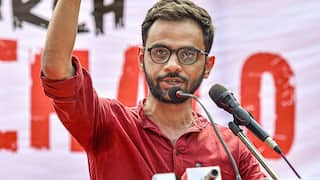Jaishankar On Pakistan: Pandavas Could Not Choose Their Relatives, We Can't Choose Our Neighbours
EAM S Jaishankar stated on Saturday that Pakistan is a reality for us. "In life, you have what you have. Pandavas could not choose their relatives, we can't choose our neighbours," he said.

New Delhi: External Affairs Minister S Jaishankar on Saturday spoke about Pakistan as a neighbour when asked if the country is an asset or a liability for India. "In life, you have what you have. Pandavas could not choose their relatives, we can't choose our neighbours. Naturally, we hope good sense prevails, that our past practises are not repeated, and that in diplomacy, it is important to be hopeful," he stated.
#WATCH | It is a reality to us. In life, you have what you have. Pandavas could not choose their relatives, we can't choose our neighbours. Naturally, we hope good sense prevails...: EAM Dr Jaishankar when asked if Pakistan, as our neighbour will be an asset or a liability to us pic.twitter.com/2g1BRIBKy7
— ANI (@ANI) January 28, 2023
Jaishankar is in Pune to launch 'Bharat Marg', the Marathi translation of his book 'The India Way'. The EAM stated that the goal was to get people involved in the country's foreign policy rather than just listen to the "mandarins" (a term generally used for powerful bureaucrats).
India has undergone a significant transformation in the last eight to nine years, and the country will be a leading power once it achieves 'atmanirbhar' (self-sufficiency), according to External Affairs Minister S Jaishankar.
"There are eight chapters in total. I wanted people to be associated with the foreign policy of the country. I'd like to include people from other states, not just Delhi. This book was written in simple language and is simple to read," he was quoted as saying by PTI.
The first chapter is about two nawabs losing Awadh to the British East India Company while playing chess, the second chapter is about globalisation and the challenges it throws up, and the third chapter is about the "dogmas of Delhi that is traditionally defined and constrained," Jaishankar said.
The first chapter is about two nawabs losing Awadh to the British East India Company while playing chess, the second about globalisation and the issues it brings, and the third about the "dogmas of Delhi that are historically defined and constrained," according to Jaishankar, as per the PTI report.
"The fourth relates to international policy. Some claim that we sit in ivory towers and analyse the world. We should not, in my opinion, delegate foreign policy to the mandarins. We must also listen to the people. When developing our foreign policy, we should keep people's feelings in mind,": PTI quoted him as saying.
Jaishankar On China And Other Issues:
He also discussed China and the problems that the country has with its ambitious northern neighbour, as well as India's relations with Japan and its position in the Indo-Pacific.
Concerning China, the EAM stated that it is India's sole neighbour which is a global power and may become a superpower in the future.
"It is evident that there would be difficulties when we have such a neighbour. One chapter of my book is about how to manage China. I've also discussed how Japan will benefit us. The nation experienced limitations after partition, but our influence today extends all the way to the Pacific Ocean," he stated as per the report.
In the book, Jaishankar also discussed the COVID-19 epidemic, the Afghanistan crisis, the Russia-Ukraine war, and how national tensions affect the world, the report added. Speaking on India's change over the last eight to nine years (since the Narendra Modi government took office in 2014), the Union minister stated that programmes such as production-linked incentives (PLI) were bringing global firms to the country.
Jaishankar also addressed terrorism, saying that no nation had suffered as much as India as a result of the "neighbour we have," an apparent reference to Pakistan, the report said.
According to the report he referred to the surgical strikes carried out in the aftermath of the attacks in Pulwama and Uri as "decisive action," emphasising India's tough stance against terrorism.
Jaishankar On Nationalism And Foreign Media Coverage Of It:
In response to a question about diplomatic efforts, Jaishankar stated: "If you look at last 9 yrs, there is no doubt that govt & politics of the day are more nationalistic...I don't think there is anything to be apologetic about it. The same nationalist people have helped countries abroad & moved forward in disaster situations in other countries. They have made progress in disaster situations. But foreign newspapers like using words like 'Hindu nationalists'. They will not speak of Europe or Christian nationalism. These are words that have been specifically reserved for us. So, the next time you see something like this, take note of how incorrectly they interpret it. This country's involvement in the world is increasing, not decreasing." In addition, the Foreign Minister stated.
If you look at last 9 yrs, there is no doubt that govt & politics of the day are more nationalistic...I don't think there is anything to be apologetic about it. The same nationalist people have helped countries abroad & moved forward in disaster situations in other countries: EAM pic.twitter.com/7QRgm3DCtm
— ANI (@ANI) January 28, 2023
(With Inputs From Agencies)
Related Video
Punjab News: AAP Leader Shot Dead During Wedding in Amritsar





































